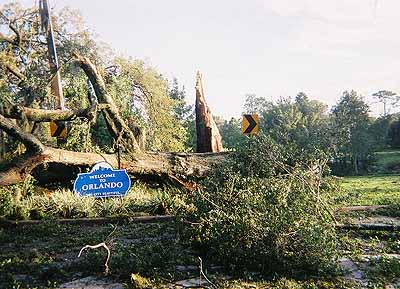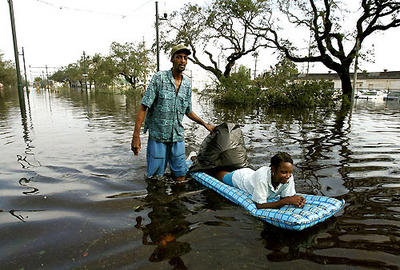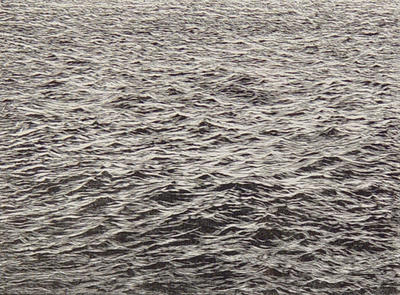On Catastrophe

A ghastly humidity since yesterday morning, seeping in from the west, off the ghost, fantails of Katrina I guess, its wake, a spoor of laden heaviness sweating the hours, giving my wife and I classic headaches, and freighting the usual ambles of the day with Her humid breath, scented with death and blue awfulness, prescient of the horrible destruction on the Mississippi Gulf coast -- all day tv's and radios delivering the sobering and then chilling news of aftermath, of many who stayed in their homes and drowned, of antebellum homes along the coast which had sustained hundreds of storms now only foundations, of levees breaking in New Orleans, flooding the entire city, of snakes in the water amid drowned pets, of 30,000 poor packed in the roof-damaged Super Dome, told to stay put without electricity or water -- ramp the magnitude of awfulness in slowly welling crescendo, and frame it in that humidity, the memory of local aftermaths, what it means to do anything without power, in the terrific heat of late southern summer ...
Typically, what we imagine -- and fear -- always looms worst in front of us rather than behind -- the fears of catastrophic storm-surge loomed highest as Katrina approached. What they sort through now in the French Quarter indicates a far lesser wave, not the tsunami of judgment but still bad -- hurricanes are fascinating in the approach and just a huge and durable pain in the ass after passing over (here in Fl., after hurricane Charley, the debris of fallen trees choked streets for weeks; only when hurricane Francis began her east-coast approach was there a frenzy to get things picked up).
The vortex of that dark imagining, chock-full of irrational and inchoate disturbings, the mind aswarm with daggers and other assorted visages of woe, all of one's life brought suddenly into relief, all one has worked for vulnerable, insufficient, intensely loved; and all that approaches like a whirl of shadow, all menance and insuppressible might -- an attack from the unconscious, Jung might have sd., our evil twin up from the badlands below for a bit of merry marauding:
And the feminine element too -- thus the 'canes alternate sexes -- the wild Morrigan bitch who don't take no for an answer, lifting her black skirts over the region, 400 miles of wicket petticoats up high and the chthon sea-bladder loosing in fury, vengeance against every way we did mama wrong, cheated on girlfriends and wives, tried to keep that old sea-sensibility quashed down with the brilliance and cocksurety of our sun-struck egos:
The hero at work in our skulls is a guilty critter, as Herakles was always in penance for his outrageousness (his 12 labors were undertaken to expiate for the passion-blind murder of his wife and two children); guilt for trying to do better than the father, guilt for every way in which he fails to measure up to the white throne housed in his superego. So these cataclysms are a form of vengeance by the father, as the flood only Noah survives is sent by an angry god to punish the errant hearts of men. Joyce was terrified of thunder -- imagine that godless god of art quailing so at that most primitive trumpet of the father -- And Hamlet's bloody court intrigue is the hero's sympathy with the devil of judgment, enacting the father's will, his wishes, at the extreme detriment of his own.
Cataclysm fascinates because it abrupts the order, turns everything upside down -- who doesn't secretly long for the very event which
destroys all? Bored no more! we hoot, watching the angry red spiral approach on radar. Here comes Everywhirl. And out of that boil, something new, slates wiped (washed, blown) clean, the building up of a new race, the blessing of starting over. How many events are so charged with anticipation of that both annihilation and rebirth?
USURY
September 12, 2001
I wanted more
catastrophe. Saw the
second jet fly approach
from the rear
twist then plow
into the tower
and thought WOW!
Real stuff! When
a few minutes
later they reported
of an explosion
at the Pentagon
I thought What next?
with all the
excitement
of one who hopes
a hurricane
won't turn and
barrel this way
instead. Sure,
I felt a dread
silence when the
towers collapsed on
everyone below. So sad.
But I was high on
events you dare
not dream of. What
next? The White House?
Disney World? I
looked out the window
to a turgid sky,
clouds dark in
their ragged approach.
Any fate headed
this way? Oboy!
Here's life at last,
as big as it gets.
Let's pop some
popcorn and gather
by a big screen TV.
Let's cheer each new
burst of flame.
Let's ride high on
the moment before
the telephones all
start to ring and
the cinders tumble
on us all.
***
Imaginings of cataclysm are one thing: aftermath is wholly another. After the wonder and awe of the approach, the fantastical bets on where the storm will land and how bad things will get (amazed accounts of 45-foot waves, threat of some tsunamilike storm surge, the morbid mind thrilling at the though of how bad things might get), then comes Reality at its worst, all imagined bets off, the done deal too damn real, nothing left to do but rummage for a few drowned relics of the former life, find a shelter, wait to rebuild. A living tenor wiped out, some new voice too fragile and unsupportable to believe in, much less chorus. Time now for finding the last remaining survivors on distant roofs, for assessing the damage, for rallying convoys of water and instant food and bandages, for shooting looters and getting drunk amid the shatter and shrieking sun. This is the agony of rebirth, not a poem or rock n roll show.
And it's not even a human show, though we suffer dearly in it: the storms aren't Ivan or Katrina, Betsy or Hugo, Camille or Andew but nature at its wildest and worst, a feral malevolence that is hardest on the innocent. I think of all those pets left behind to be crushed or drowned ... of trees grown for patient decades (centuries even) looking like so many outraged ladies, sprawled on lawns and roads and over houses, leaf-skirts scattered, spines broken, raw white splinters pointing at the sky. This was how it looked in Central Florida after Hurricane Charley last year:

LAMENT FOR THE TREES
The news reports so few
died in Hurricane Charley's
path -- most in trailer parks
down in Punta Gorda, folded
up in their homes like Amens
by dark hands gripping down
at the end of prayer -- but
the choke and stink of dead
oaks runs a Tartarean stream
twenty miles wide from Charlotte
County up Polk through Osceola
Orange Seminole and Volusia
Counties, strickening all who
live or must pass through
that harrowed zone with the
vertigo of what fell down
when greater winds blew
round. The oaks lay everywhere
across our dreams of paradise,
like wooly mastodons heaped
over broken iron fences
and blocking side streets
of all passage as traffic creeps
slowly by, careful not to
brush the jutting fingers of
heaped limbs and timber
next to the curb. Above all
the mid-August sun is white
as a boil or a canker
causing trouble in the sky,
grinning high above the
shrivelling bower of
slaughter. Maybe it's just
the rot we can't smell in
our human way, but still
a scent fills these days
like some ravening, mythic
afterbirth of death, part
turkey buzzard, part riot of
the carcinomia, so much
more exposed by the sun.
And while we sleep, what
ghosts raise from their
savaged split and fallen
graves, marrowed with
the green pith of arching
light, sighing and twisting
so to remembered breezes,
moonlight glitters on ghost-
leaves, or tears, or dew --
all that won't collect in
those brutal, tree-shaped
spaces tomorrow's sun
will maul on through.
Awesome and awful to nth degrees: what have we to equal the menace of a 400-mile-wide storm? What have our 60 or 100 dead to say to the millionfold plasms of our same ache now floating seaward in a sepulchre of muddy retch?
Humbling.

Folktales are rich with stories of inundated towns, often due to the disturbance of a water-spirit living down a well, in punishment for a sin, or simply because someone forgot to tend something crucial. All are instances, IMO, of the hero's guilt which invites catastrophe. There's always a fissure in our bright visage, a chink in the armor, a crack in the wall, a fatal character flaw through which floods the madness of unconsciousness. Stories of cataclysm seem to bear this out.
These tales are from John Rhys' Celtic Folklore: Welsh and Manx (1901)
***
There was a man of the name of Owen living in Mynyd Mawr, and he had a well ("fynnon"). Over this well he kept a large flag or flagstone, which he was always careful to replace over its mouth after he had satisfied himself or his beast with water.
It happened, however, that one day he went on horseback to the well to water his horse, and forgot to put the flag back in its place. He rode off leisurely in the direction of his home; but, after he had gone some distance, he casually looked back and, to his great astonishment, he saw that
the well had burst out and was overflowing the whole place.
He suddenly bethought to ride back and encompass the overflow of water as fast as he could; and it was the horse's track in galloping round the water that put a stop to its further overflow.
It is fully believed that, had he not galloped round the flood in the way he did, the well would have been sure to inundate the whole district and drown all. Hence the lake was called the Lake of Owen's Flag, "Llyn Lech Owen"
***
In Cantre Gwaelod, or the Bottom Hundred (there is) a fine spacious country supposed to be submerged in Cardigan Bay. Modern euphemism treats it as defended by embankments and sluices, which, we are told, were in the charge of the prince of the country, Seithennin, who, being one day in his cups, fogot to shut the sluices and thus brought about the inundation.
***
Boand, wife of Nechtitn son of Labraid, went
to the secret well which was in the green of sid
Nechtdin (Trinity Well, the source of the river Boyne, located in the Barony of Carbury in Co. Kildare). Whoever went to it would not come from it without his two eyes bursting, unless it were Nechtitn himself and his three cup-bearers.
Once upon a time Boand went through pride to test the well's power, and declared that it had no secret force which could shatter her form, and thrice she walked widdershins round the well. Whereupon three waves from the well broke over her head and deprived her of a thigh, one of her hands and one of her hands. Then she, fleeing her shame, turned seaward, with the water behind her as far as Boyne-mouth, where she drowned. This explains why the river is called Boand, "Boyne."
A version to the same effect in in the Book of Leinster, fol. 191A, makes the general statement that no one who gazed right into the well could avoid the instant ruin of his two eyes or otherwise escape with impunity.
***
Tradition relates that Bala Lake is but the watery tomb of the palaces of iniquity; and that some old boatmen can on quiet moonlight nights in harvest see towers in ruins at the bottom of its waters, and also hear at times a feeble voice saying, "Dial a daw, dial a itaw," 'Vengeance will come'; and another voice inquiring, "Pa bryd y daw," 'When will it come?' Then the first voice answers, "Yn y drydedd genhedlaeth," 'In the third generation.'
Those voices were but a recollection over oblivion, for in one of those palaces lived in days of yore an oppressive aud cruel prince, corresponding to the well-known description of one of whom it is said, 'Whom he would he slew; and whom he would he kept alive.' The oppression and cruelty practised by him on the poor farmers were notorious far and near. This prince, while enjoying the morning breezes of summer in his garden, used frequently to hear a voice saying, 'Vengeance will come.' But he always laughed the threat away with reckless contempt.
One night a poor harper from the neighbouring hills was ordered to come to the prince's palace. On his way the harper was told that there was great rejoicing at the palace at the birth of the first child of the prince's son. When he had reached the palace the harper was astonished at the number of the guests, including among them noble lords, princes, and princesses: never before had he seen such splendour at any feast. When he had begun playing the gentlemen and ladies dancing presented a superb appearance. So the mirth and wine abounded, nor did he love playing for them any more than they loved dancing to the music of his harp.
But about midnight, when there was an interval in the dancing, and the old harper had been left alone in a comer, he suddenly heard a voice singing in a sort of a whisper in his ear, 'Vengeance, vengeance!' He turned at once, and saw a little bird hovering above him and beckoning him, as it were, to follow him. He followed the bird as fast as he could, but after getting outside the palace he began to hesitate. But the bird continued to invite him on, and to sing in a plaintive and mournful voice the word 'Vengeance, vengeance!' The old harper was afraid of refusing to follow, and so they went on over bogs and through thickets, whilst the bird was all the time hovering in front of him and leading him along the easiest and safest paths. But if he stopped for a moment the same mournful note of 'Vengeance, vengeance!' would be sung to him in a more and more plaintive and heartbreaking fashion.
They had by this time reached the top of the hill, a considerable distance from the palace. As the old harper felt rather fatigued and weary, he ventured once more to stop and rest, but he heard the bird's warning voice no more. Helistened, but he heard nothing save the murmuring of the little burn hard by. He now began to think how foolish he had been to allow himself to be led away from the feast at the palace: he turned back in order to be there in time for the next dance. As he wandered on the hill he lost his way, and found himself forced to await the break of day. In the morning, as he turned his eyes in the direction of the palace, he could see no trace of it: the whole tract below was one calm, large lake, with his harp floating on the face of the waters.


<< Home